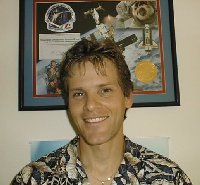Meet the IBEX Team: John Bernardin

To John Bernardin, engineering is a lot like creating a work of art. "It's kind of like being an artist. You get to be very creative, and design and build things that other people haven't thought about," John said.
He exercises his creativity daily as Instrument Manager and Lead Engineer for the IBEX-Hi sensor at Los Alamos National Laboratory in New Mexico. "I work with the lead scientist, and he and I direct the team to design the sensor and get it built. The scientist tells me what he needs the sensor to do, and I work with engineers to build what he needs," John said.
John thrives on the creativity required to design and build spacecraft parts for the harsh conditions of space. "I think the best part of my job is being creative; getting to design something that no one has ever done before, or very few people have ever attempted. You're free to think and create something. Many people don't realize just how much hard work and creative thinking has gone on behind the scenes on a NASA program to develop an instrument to explore the far reaches of space," he said.
Growing up in Appleton, Wisconsin, John wasn't always interested in engineering as a career. As a child, he aspired to be a professional athlete! However, with a chemist for a father and three older siblings studying science in college, it wasn't too hard for John to imagine working in science himself one day. "My dad and my older brother were my inspiration. They were my role models, they participated in everything I did in my growing up, and they were both scientists, so it was natural to follow in their footsteps," he said.
His science-minded family helped him develop an early interest in figuring out how things work. "I come from a high-brain powered family, and that encouraged me to become a tinkerer - taking things apart and wondering how things worked at a young age - so I naturally grew into the engineering field. I was building things, blowing things up, and learning to be creative as a youngster," John said.
These youthful experiments blossomed into a career in engineering. "It's funny, you kind of find your match in life based on your experience. I was heading in the direction of engineering, and I didn't even know it. Being good at math and building models led me into it. I started asking, 'Who designs cars?' and 'Who designs radios?' and I discovered, 'Oh, that's an engineer,'" John said.
He pursued undergraduate studies at the University of Wisconsin at Milwaukee and then earned a master's degree and PhD in mechanical engineering from Purdue University. "Of everything I've done in my life up to this point," John said, "The biggest challenge was getting through college. I think that once you get to a point in your education where you create goals for yourself and begin meeting those milestones, future difficulties are much easier to overcome. Any education beyond high school is never that easy, but you've got to want it, and if you stick with it, the rewards are endless."
Education was the key to John's success as an engineer. "It's important for young people to know that if you don't get an education, you won't get a job like this. The most important thing that my education gave me was the ability to learn new things. At work, we face problematic situations all the time where we don't know the answer. We have to rely on our education and creativity to find the answer. We have to know how to go to a book or call on the right people to figure it out. College, high school, and trade school help you develop the skills to be a good thinker and to foster the desire to continue the learning process," John said.
It is imperative, he continued, that young people continue their educations. "[I would advise young people] to get an education, and continue their education as much as they reasonably can. In the NASA programs, there are great career opportunities for everyone from technicians, to engineers, to scientists, but each of these areas requires an education. Going to trade school, learning on the job, or going to college can open many doors of opportunity. Education is everything."
John sees an educated young America as the key to solving global problems. "I think science and engineering will lead our country and the world in providing for the people. In the era that we're living in, technology is becoming more and more important. It's going to be engineers, scientists, and other creative thinkers who find solutions for the future problems in a very populated world," he said.
Although he enjoys the creativity of his engineering job, John never quite gave up his childhood goal of becoming a professional athlete. "I'm an amateur bike racer and cross-country ski racer. I didn't quite get to the professional level, but I did make it to the top of the amateur ranks!" he said. "However, if I want to eat, I'll need to keep my day job as a Mechanical Engineer."